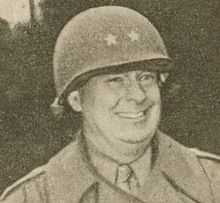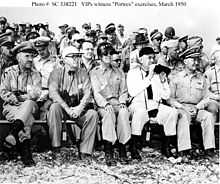William Henry Harrison Morris, Jr.
| William Henry Harrison Morris, Jr. | |
|---|---|
 Morris as commander of 10th Armored Division, 1945 | |
| Born |
March 22, 1890 Ocean Grove, New Jersey |
| Died |
March 30, 1971 (aged 81) Washington, D.C. |
| Buried at | Arlington National Cemetery |
| Allegiance |
|
| Service/branch |
|
| Years of service | 1911–1952 |
| Rank |
|
| Commands held |
6th Armored Division II Armored Corps XVIII Airborne Corps 10th Armored Division VI Corps Caribbean Defense Command |
| Battles/wars |
World War I World War II |
| Awards |
Distinguished Service Cross Distinguished Service Medal Silver Star Purple Heart Bronze Star |
William Henry Harrison Morris, Jr. (March 22, 1890 - March 30, 1971) was a lieutenant general in the United States Army who fought in World War I and World War II.
Early life
He was born in the Ocean Grove section of Neptune Township, New Jersey on March 22, 1890, and graduated from the United States Military Academy at West Point in 1911.
Early career
Morris was commissioned as a second lieutenant in the Infantry and assigned to the 19th Infantry Regiment at Camp Jossman, Philippine Islands. He then served at Fort McKinley, afterwards transferring to the 5th Infantry with duty in Tientsin, China, where he served from 1912 to 1914.
In 1914 Morris was assigned to the 9th Infantry Regiment in Laredo, Texas, where he served until 1916. Morris was then appointed as a Reserve Officer Training Corps instructor and basketball coach at Texas Agricultural and Mechanical College (now Texas A&M University), where he served until 1917, when he returned to the 9th Infantry as its Intelligence officer, S-2.
World War I
Morris served in France during World War I as commander of a battalion in the 360th Infantry Regiment. He was wounded on November 1, just a few days before the end of hostilities, an action for which he received the Distinguished Service Cross and the Purple Heart. He remained in Europe for occupation duty, commanding his battalion in Germany, and then serving on the staffs of the American Expeditionary Force's General Headquarters and the IX Corps.
Post-World War I
After the war Morris returned to the United States as a Reserve Officer Training Corps instructor at Pennsylvania's Bucknell University.
He graduated from the General Staff School at Fort Leavenworth, Kansas in 1925.
In 1930 Morris graduated from the Army War College.
In 1937 he served with the 66th Infantry Regiment at Fort Benning, Georgia.
From 1938 to 1940 Morris served on the War Department General Staff in Washington, D.C.
World War II
During World War II Morris commanded the 6th Armored Division during its stateside training, receiving promotion to brigadier general in January, 1942 and Major General the following May. In 1943 and 1944 he commanded II Armored Corps, which was later reorganized as the XVIII Airborne Corps.
In 1945 Morris commanded 10th Armored Division, and played a vital role in the relief of Bastogne during the Battle of the Bulge. After Germany's surrender, he was assigned to command VI Corps.
Post-World War II
From 1945 to 1948 General Morris served on the War Department Personnel Board in Washington, D.C.
In 1949 he was assigned as head of the U.S. Caribbean Command as a lieutenant general, where he remained until his 1952 retirement.
Awards and decorations

General Morris's awards and decorations included the Distinguished Service Cross, Distinguished Service Medal, Silver Star, Legion of Merit, Bronze Star and Purple Heart.
Retirement and death
General Morris died on March 30, 1971 in Washington, D.C.. He is buried in Arlington National Cemetery, Section 5, Grave 47.
Citation for Distinguished Service Cross
For extraordinary heroism in action near Villers-devant-Dun, France, November 1, 1918. During darkness he led his battalion in an attack under heavy artillery and machine-gun fire. Upon reaching a hill he exposed himself to heavy fire to reconnoiter personally the enemy position, and then, although wounded by a machine-gun bullet, heroically led his battalion in their advance, refusing to be evacuated, inspiring his men by his personal courage.
Name: Morris, William H.H., Jr. Rank: Major, U.S. Army Organization: 360th Infantry Regiment, 90th Division, A.E.F. Date of Action: November 1, 1918 Order: General Orders 87, War Department, 1919 Home Town: Ocean Grove, New Jersey
References
- Biographical Register of the Officers and Graduates of the U.S. Military Academy, by George W. Cullum, edited by Wirt Robinson, 1920, page 1549
- The Congressional Medal of Honor, the Distinguished Service Cross and the Distinguished Service Medal Issued by the War Department since April 6, 1917, up to and Including General Orders, No. 126, War Department, November 11, 1919, published by the U.S. Army Adjutant General's Office, 1919, page 418
- Who Was Who in America: With World Notables, published by Marquis Who's Who, LLC, 1973, page 513
- Annual Report of the General Service Schools, 1924–1925, page 12,
- Army List and Directory, published by U.S. Army Adjutant General's Office, 1937, page 284
- Hitler's Last Gamble: the Battle of the Bulge, December 1944-January 1945, Trevor Nevitt Dupuy, David L. Bongard, Richard Claire Anderson, 1994, page 200
- Military Times, Hall of Valor, List of Recipients, Distinguished Service Medal
- Newspaper article, Gen. Mark Clark to Command Field Forces; Wedemeyer Will Succeed Him at Presidio, New York Times, August 25, 1949
- Newspaper article, Caribbean Commander to Quit, New York Times, February 7, 1952
- Official Army Register, published by U.S. Army Adjutant General's Office, 1946
- U.S. Army Register, published by U.S. Army Adjutant General's Office, 1964